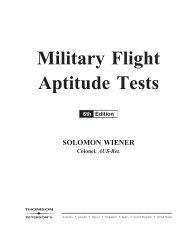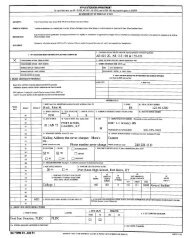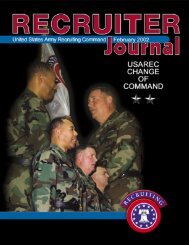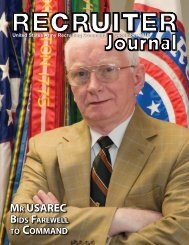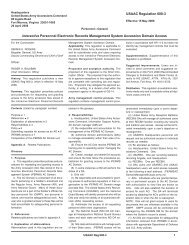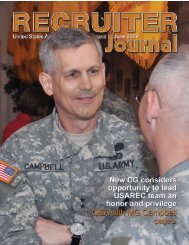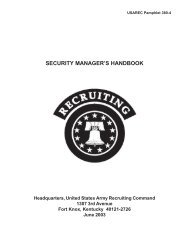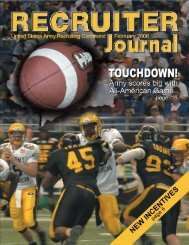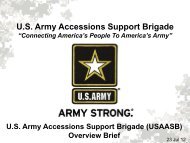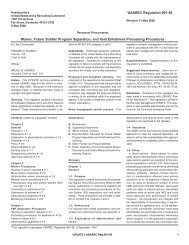19 Dec Cover.pmd - USAREC - U.S. Army
19 Dec Cover.pmd - USAREC - U.S. Army
19 Dec Cover.pmd - USAREC - U.S. Army
Create successful ePaper yourself
Turn your PDF publications into a flip-book with our unique Google optimized e-Paper software.
16<br />
Problems with this investigation:<br />
- No sworn statements.<br />
CRITIQUE<br />
- Telephone interviews were used instead of face-to-face interviews. Face-to-face interviews should be<br />
conducted whenever possible considering time, distance, and the criticality of the witness. Mere<br />
inconvenience cannot excuse failing to interview material witnesses in person. If a material witness has<br />
moved away, ask the appointing authority to request support from another recruiting company or<br />
recruiting battalion.<br />
Telephone interviews may be conducted only when it is clearly impractical to conduct a face-to-face<br />
interview.<br />
- Using evidence not in the file in discussions and findings.<br />
- Inferring guilt solely from invocation of rights.<br />
- Failure to include documentary evidence (<strong>USAREC</strong> Contact History, DD Form <strong>19</strong>66, and DD Form 2807-<br />
2, etcetera).<br />
- Failure to interview other witnesses such as security interviewer, guidance counselor, or others in the<br />
recruiting station.<br />
- Some conclusions (for example, credibility of Mr. Applicant) were inadequately supported by evidence<br />
in the file. In fact, there is no evidence to corroborate Mr. Applicant’s statement that he had strained<br />
his back and that he told SFC Recruiter about the injury.<br />
- Failure to adequately support the recommendations. Not every RI warrants relief. In this case, although<br />
SFC Recruiter declined to make a statement, he might have mistakenly believed that medical<br />
documentation was needed before reporting the injury. A better investigation could have resolved this<br />
issue.<br />
- The scope of the investigation (paragraph 2 of the ROI) usually is a restatement of the instructions by<br />
the appointing authority. An overly detailed appointing order is not “wrong” but may inadvertently<br />
constrict the investigation. The appointing order should describe the general parameters of the<br />
investigation, and the IO should ensure that specific instances of wrongful conduct are investigated. For<br />
these reasons, the general scope paragraph used as an example in the “good” investigation is preferred.<br />
- Format of the investigation is not correct.<br />
<strong>USAREC</strong> Pam 27-65 • 20 <strong>Dec</strong>ember 2012



